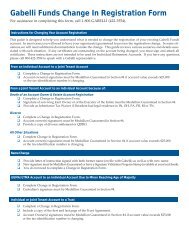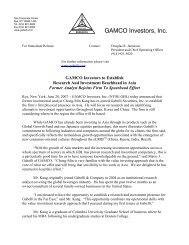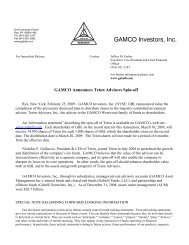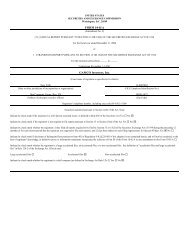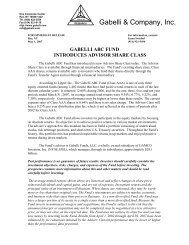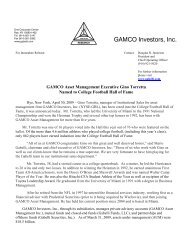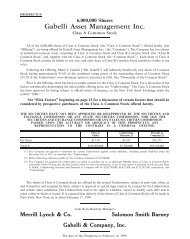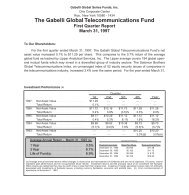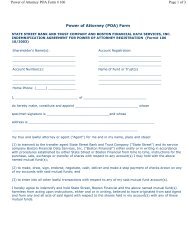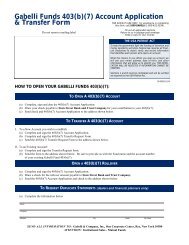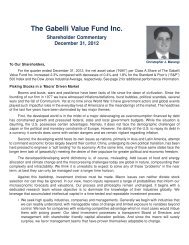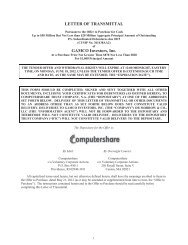Statement of Additional Info - Gabelli
Statement of Additional Info - Gabelli
Statement of Additional Info - Gabelli
Create successful ePaper yourself
Turn your PDF publications into a flip-book with our unique Google optimized e-Paper software.
Institutional investors depend on an efficient institutional market in which the unregistered security can be readily resold<br />
or on an issuer's ability to honor a demand for repayment. As a result, the fact that there are contractual or legal<br />
restrictions on resale to the general public or to certain institutions may not be indicative <strong>of</strong> the liquidity <strong>of</strong> such<br />
investments.<br />
Each Fund may invest up to 10% (except for the SmallCap Equity Fund, Mighty Mites Fund, and Income Fund which<br />
may invest up to 15%) <strong>of</strong> its net assets in illiquid securities, including certain restricted securities issued under Section<br />
4(2) <strong>of</strong> the Securities Act. Section 4(2) instruments are restricted in the sense that they can only be resold through the<br />
issuing dealer and only to institutional investors; they cannot be resold to the general public without registration.<br />
Restricted securities issued under Section 4(2) <strong>of</strong> the Securities Act will generally be treated as illiquid and subject to<br />
each Fund's investment restriction on illiquid securities unless such securities are eligible for resale under Rule 144A and<br />
are deemed to be liquid in accordance with the procedures described below.<br />
Rule 144A under the Securities Act allows a broader institutional trading market for securities otherwise subject to<br />
restriction on resale to the general public. Rule 144A establishes a "safe harbor" from the registration requirements <strong>of</strong> the<br />
Securities Act applicable to resales <strong>of</strong> certain securities to qualified institutional buyers. It is the intent <strong>of</strong> the Funds to<br />
invest, pursuant to procedures established by the Board and subject to applicable investment restrictions, in securities<br />
eligible for resale under Rule 144A which are determined to be liquid based upon the trading markets for the securities.<br />
The Adviser will monitor the liquidity <strong>of</strong> restricted securities eligible for resale under Rule 144A in a Fund's portfolio<br />
under the supervision <strong>of</strong> the Trustees. In reaching liquidity decisions, the Adviser will consider, inter alia, the following<br />
factors: (1) the frequency <strong>of</strong> trades and quotes for the security over the course <strong>of</strong> six months or as determined in the<br />
discretion <strong>of</strong> the Adviser; (2) the number <strong>of</strong> dealers wishing to purchase or sell the security and the number <strong>of</strong> other<br />
potential purchasers over the course <strong>of</strong> six months or as determined in the discretion <strong>of</strong> the Adviser; (3) dealer<br />
undertakings to make a market in the security; (4) the nature <strong>of</strong> the security and the nature <strong>of</strong> how the marketplace trades<br />
(e.g., the time needed to dispose <strong>of</strong> the security, the method <strong>of</strong> soliciting <strong>of</strong>fers, and the mechanics <strong>of</strong> the transfer); and<br />
(5) other factors, if any, which the Adviser deems relevant. The Adviser will also monitor the purchase <strong>of</strong> Rule 144A<br />
securities which are considered to be illiquid to assure that the total <strong>of</strong> all such Rule 144A securities held by a Fund does<br />
not exceed 10% <strong>of</strong> the Fund’s average daily net assets (except for the Mighty Mites Fund, SmallCap Equity Fund, and<br />
Income Fund, which may invest up to 15%).<br />
Other Investment Considerations. Investment decisions for each Fund are made independently from those <strong>of</strong> other<br />
investment advisory accounts that may be advised by the Adviser or the Sub-Adviser. However, if such other investment<br />
advisory accounts are prepared to invest in, or desire to dispose <strong>of</strong>, securities <strong>of</strong> the type in which a Fund invests at the<br />
same time as the Fund, available investments or opportunities for sales will be allocated equitably to each <strong>of</strong> them. In<br />
some cases, this procedure may adversely affect the size <strong>of</strong> the position obtained for or disposed <strong>of</strong> by a Fund or the price<br />
paid or received by the Fund.<br />
Risks Associated With Recent Economic Events<br />
The U.S. credit markets have been experiencing extreme volatility and disruption for more than five years. Instability in<br />
the credit markets has made it more difficult for a number <strong>of</strong> issuers <strong>of</strong> debt securities to obtain financing or refinancing<br />
for their investment or lending activities or operations. In particular, because <strong>of</strong> volatile conditions in the credit markets,<br />
issuers <strong>of</strong> debt securities may be subject to increased cost for debt, tightening underwriting standards and reduced<br />
liquidity for loans they make, securities they purchase and securities they issue. These developments may increase the<br />
volatility <strong>of</strong> the value <strong>of</strong> securities owned by a Fund. These developments may also make it more difficult for a Fund to<br />
accurately value its securities or to sell its securities on a timely basis. These developments may also adversely affect the<br />
broader economy, which in turn may adversely affect the ability <strong>of</strong> issuers <strong>of</strong> securities owned by a Fund to make<br />
payments <strong>of</strong> principal and interest when due, lead to lower credit ratings <strong>of</strong> issuers and increased defaults by issuers. Such<br />
developments could, in turn, reduce the value <strong>of</strong> securities owned by a Fund and adversely affect the net asset value<br />
(“NAV”) <strong>of</strong> its shares.<br />
The Dodd-Frank Wall Street Reform and Consumer Protection Act (the "Dodd-Frank Act") significantly revises and<br />
expands the rulemaking, supervisory and enforcement authority <strong>of</strong> federal bank, securities and commodities regulators. It<br />
is unclear how these regulators will exercise these revised and expanded powers and whether they will undertake<br />
rulemaking, supervisory or enforcement actions that would adversely affect a Fund or investments made by a Fund.<br />
Possible regulatory actions taken under these revised and expanded powers may include actions related to financial<br />
consumer protection, proprietary trading and derivatives. There is a risk that new and additional government regulation<br />
19




